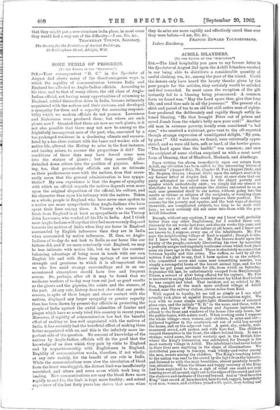SOME PERILS OP PROGRESS.
[To THE EDITOR. OF THE "SPECTATOR."] SzE,—Your correspondent " H. C." in the Spectator of August 2nd shows many of the disadvantageous ways in which the rapidity of communication between India and England has affected us Anglo-Indian officials. According to his view, and to that of many others, the old class of Anglo- Indian official, not having many opportunities of returning to England. settled themselves down in India, became intimately acquainted with the natives and their customs, and developed a sympathy for them and a capacity for assuming responsi- bility which we modern officials do not possess. Lawrences and Nicbolsous were produced then; but where are such giants now ? Granted that there are now no such giants, is it not also possible that there may not now be among us the frightfully incompetent men of the past, who, enervated by a too prolonged residence in a deadening climate and emascu- lated by a too close contact with the baser and weaker side of native life, allowed the Mutiny to arise in the first instance, and having arisen, to assume the proportions it did ? The conditions of those days may have forced some men into the stature of giants ; but they assuredly also dwindled down others into the position of pigmies. Allow- ing, too, that present-day officials are not so intimate as their predecessors were with the natives, does that neces- sarily mean that the general administration is less sywpa- thetic ? My own experience is that the degree of sympathy with which an official regards the natives depends even more upon the original disposition of the official, his culture, and his character than upon his intimacy with the natives. Taken as a whole, people in England who have never once spoken to a native are more sympathetic than Anglo-Indians who have spent their lives among them. A Viceroy who comes out fresh from England is at least as sympathetic as the Viceroy John Lawrence, who worked all his life in India. And I think most Anglo-Indians will say that they feel more warmly disposed towards the natives of India when they are home in England surrounded by English influences than they are in India when surrounded by native influences. If, then, we Anglo- Indians of to-day do not look to India as our home like our fathers did, and if we more constantly visit England, we may be less intimate with native life, but we have the counter- balancing advantage of being more in touch with our own English life and with those deep springs of our national strength and greatness to which it is all-important that we who live amid strange surroundings and in an un- accustomed atmosphere should have free and frequent access. So, perhaps, after all it may be found that we mediocre workers of to-day may turn out just as good results as the giants and the pigmies, the saints and the sinners, of the past. At any rate, history does not show that our prede- cessors, in spite of their longer and closer contact with the natives, displayed any larger sympathy or greater capacity than has been shown by present-day officials in protecting the people of India against the awful calamities of famine and plague which have so sorely tried this country in recent years. Moreover, if rapidity of communication has had the baneful effect of making us less well acquainted with the natives of India, it has certainly had the beneficial effect of making them better acquainted with us, and this is the infinitely more im- portant side of the question. No amount of knowledge of the natives by Anglo-Indian officials will do the good that the knowledge of us does which they gain by visits to England and by acquaintanceship with Englishmen in England. Rapidity of communication works, therefore, if not wholly, at any rate mainly, for the benefit of our rule in India. While the communications were slow the circulation of blood from the heart was sluggish, the distant limb was insufficiently nourished, and ulcers and sores arose which took long in healing. Now communications are easy the blood flows more rapidly to and fro, the limb is kept more healthy; and actual experience of the last forty years has shown that sores when
they do arise are more rapidly and effectively cured than ever they were before.—I am, Sir, &c., Indore Residency.
FRANCIS EDWARD YOIITGfiHUsBANO.






































 Previous page
Previous page